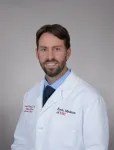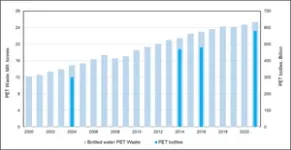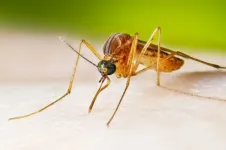(Press-News.org) LOS ANGELES — More than 37 million Americans have diabetes, and approximately 90-95% have Type 2 diabetes.
Diabetes is a chronic condition where the body does not produce or effectively use insulin. A lack of insulin leads to raised blood glucose (sugar) levels, which can cause heart disease and stroke, kidney disease, nerve damage and other severe complications.
Keck Medicine of USC has launched a Phase 2 clinical trial investigating the effectiveness of a new outpatient, nonsurgical endoscopic procedure in stabilizing blood glucose levels for patients.
“Currently, the only treatment for diabetes not managed with lifestyle changes are oral medications or, in the case of advanced disease, insulin injections, both of which can be costly or have side effects,” said Luke Putnam, MD, lead investigator of the clinical trial and a gastrointestinal surgeon with Keck Medicine. “If this therapy is proven effective, it could eliminate the need for medication or insulin, or potentially prevent disease progression so it does not lead to organ failure and other debilitating conditions.”
This innovative procedure is designed for patients before they require insulin and targets the duodenum, the first part of the small intestine that works with the pancreas to regulate insulin and blood glucose levels.
Recent data suggests the duodenum plays an important role in glucose regulation, and in patients with Type 2 diabetes, the cells lining the duodenum become damaged.
The clinical trial is testing a device inserted via an endoscope into the duodenum that ablates (removes) the poorly functioning cells through precise, controlled electrical pulses.
The study researchers hypothesize that ablating the damaged cells will promote the regrowth of healthy cells, which will better regulate blood glucose levels.
The procedure takes about an hour and is done under general anesthetic. Patients are discharged the same day and can continue normal activities a few days later.
“Previous studies have shown that ablation of cells in the duodenum is effective in controlling blood sugar levels, so we are optimistic this study will produce successful results,” said Putnam.
Clinical trial participant Mark Canning, a 60-year-old Los Angeles resident who was diagnosed with Type 2 diabetes in 2015, is seeing progress controlling his blood glucose since undergoing the procedure in January. “My blood sugar levels are falling, and I am feeling very encouraged,” he said.
The clinical trial is currently enrolling new patients. To qualify for the study, patients must be between the ages of 22-65 and have a history of Type 2 diabetes between three to 10 years. Participants can be on oral medications but not insulin.
Those interested in participating in the study should contact Christian Romero at christian.romero@med.usc.edu.
John Lipham, MD*, a gastrointestinal surgeon with Keck Medicine, is co-investigator of the study.
###
Download b-roll of clinical trial participant Mark Canning undergoing an outpatient, nonsurgical endoscopic procedure that may help patients stabilize blood glucose levels.
For more information about Keck Medicine of USC, please visit news.KeckMedicine.org
* Lipham has a financial interest in the company sponsoring this study. He is a consultant for the sponsoring company, Endogenex, Inc. The nature of this conflict and the management of the conflict of interest have been reviewed by the USC Conflict of Interest Review Committee.
END
New UC Riverside research makes it likely that proteins responsible for activating mosquito sperm can be shut down, preventing them from swimming to or fertilizing eggs.
The study could help control populations of Culex, the common house mosquito that transmits brain-swelling encephalitis and West Nile Virus.
“During mating, mosquitoes couple tail to tail, and the males transfer sperm into the female reproductive tract. It can be stored there awhile, but it still has to get from point A to point B to complete fertilization,” said Cathy Thaler, UCR cell biologist and the study’s first author.
Key to completing that journey are the specialized proteins secreted ...
Arlington, Va., March 16, 2023 – Findings from a new study published in the American Journal of Infection Control (AJIC), highlight perceptions of and barriers to reliable hand hygiene among specific clinician subgroups. The results, from the first study of its kind, provide insights that can be used to design and implement future, targeted interventions to optimize hand hygiene reliability among medical professionals.
“While prior studies focused on challenges to hand hygiene reliability by healthcare role, we believe our study is the first to highlight key differences in perceived barriers ...
Many people keen to reduce their meat consumption are turning to substitutes made of legumes packed with protein, vitamins, and fiber. But allergies to legumes like soy or peanuts are both common and dangerous. Are patients allergic to particular legumes at risk from meat-free proteins made of legumes even if they contain different legumes? Dr Mark Smits and a team of scientists at University Medical Center Utrecht set out to investigate.
“Both protein consumption and the world’s population are increasing which leads to an urgent demand for sustainable ...
A small nucleus in the brainstem called locus coeruleus (literally the “blue spot,”) is the primary source of a major neuromodulator, norepinephrine (NE), an important mediator of the ‘fight or flight’ response in animals. However, very little is known about the local connections of this small albeit critically important group of neurons. A recent pioneering study published in eLife from the laboratory of Dr. Xiaolong Jiang, investigator at the Jan and Dan Duncan Neurological Research Institute (Duncan NRI) ...
More donated hearts could be suitable for transplantation if they are kept functioning within the body for a short time following the death of the donor, new research has concluded.
The organs are kept functioning by restarting local circulation to the heart, lungs and abdominal organs – but, crucially, not to the brain – of patients whose hearts have stopped beating for five minutes or longer and have been declared dead by circulatory criteria (donation after circulatory death, or DCD).
It is hoped that this technique could increase the number of usable donated hearts by as much as 30% in the future, helping address ...
**Note: the release below is a special early release from the European Congress of Clinical Microbiology & Infectious Diseases (ECCMID 2023, Copenhagen, 15-18 April). Please credit the congress if you use this story**
Embargo – 2301H UK time Wednesday 15 March
A review from WHO on the number of new antibiotics currently in the pipeline shows that just 12 new antibiotics have entered the market in the five years from 2017-21. And there are far too few (just 27) under development in clinical trials against pathogens considered critical* by WHO such as Acinetobacter baumannii and Pseudomonas aeruginosa. ...
Sophia Antipolis, 16 March 2023: Sleeping less than five hours a night is associated with a 74% raised likelihood of developing peripheral artery disease (PAD) compared with seven to eight hours. That’s the finding of a study published today in European Heart Journal – Open, a journal of the ESC.1
“Our study suggests that sleeping for seven to eight hours a night is a good habit for lowering the risk of PAD,” said study author Dr. Shuai Yuan of the Karolinska Institute, Stockholm, ...
A new analysis of global rankings of life expectancy over seven decades shows the UK has done worse than all G7 countries except the USA. Researchers writing in the Journal of the Royal Society of Medicine say that while UK life expectancy has increased in absolute terms over recent decades, other, similar countries are experiencing larger increases.
In 1952, when Queen Elizabeth II came to the throne, the UK had one of the longest life expectancies in the world, ranking seventh globally behind countries such as Norway, Sweden and Denmark. ...
The Tasmanian devil roams the island state of Australia as the apex predator of the land, feeding on whatever it pleases as the top dog – or the top devil. But some of these marsupial scavengers could be starting to miss out on a few items from the menu.
According to a study led by UNSW Sydney, living in human-modified landscapes could be narrowing the diet of the Tasmanian devil. The research, published recently in Scientific Reports, suggests devils have access to vastly different cuisines depending on the type of environment they live in.
“We found Tasmanian devil ...
They were a group of young, scrappy, but brilliant University of Utah computer science students and professors who changed the world.
Ed Catmull. John Warnock. Jim Clark. Alan Kay. Ivan Sutherland. Martin Newell. They are a just a handful of the luminaries in the late 1960s and 1970s who revolutionized computer graphics by inventing technologies that have aided and shaped countless industries today.
For the first time ever, these and other legends of that time will be reuniting on the U campus Thursday, March 23, and Friday March 24, to commemorate their roles as ...



